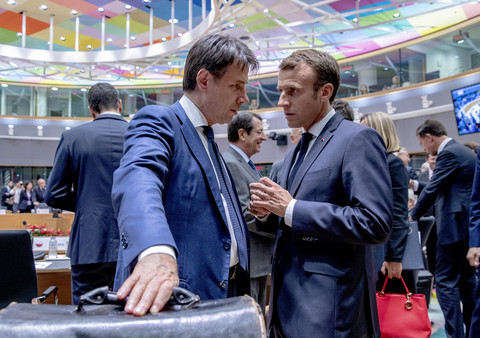Coronavirus sees approval-rating soar for EU leaders
By Alena Kudzko and Shane Markowitz
(Suggestion by Dr Constantinos Adamides)
-

Italian prime minister Giuseppe Conte (left) has seen his approval ratings soar to 71 percent, whilst French president Emmanuel Macron is up to 51 percent, figures echoed among other EU leaders (Photo: Council of the European Union)
The prevailing wisdom holds that the Covid-19 pandemic could “break the EU”, lead to the renationalisation of competencies, and create an inward looking continent devoid of solidarity.
Yet this temporary trauma belies the tremendous opportunity emerging to create a more integrated and cohesive European Union.
Over 70 years ago, the shared distress and trauma of World War II endowed national political leaders with the trust and latitude necessary to overcome decades of hostility and make politically difficult decisions to create the institutions that would become the EU.
Against the backdrop of a different form of tragedy today, European societies are once again rallying behind their national political leaders.
While previous rounds of crises over migration and austerity challenged the popularity of even the most durable of political leaders, this crisis has fomented an unprecedented situation in which European governments have all simultaneously earned the confidence of domestic populations.
Italian prime minister Giuseppe Conte has seen his overall approval ratings soar to 71 percent (+27 points), Austrian chancellor Sebastian Kurz to 77 percent (+33 points), Dutch prime minister Mark Rutte to 75 percent (+30 points), and Danish prime minister Mette Frederiksen to 79 percent (+40 points).
German chancellor Angela Merkel’s already respectable job performance numbers have risen to 79 percent (+11 points), leading pundits to declare that she “is back”.
And in France where political leaders are accustomed to paltry approval figures (former president Francois Hollande infamously once clocked in at four percent), president Emmanuel Macron has spiked to 51 percent approval (+15 points).
Political parties have benefited too with, for example, the highest support in decades for the centre-right ÖVP in Austria and centre-left Social Democrats in Denmark.
This surge in approval for political leaders and parties across the continent, no doubt, presents both opportunities and risks.
Endeavors to move the European project forward could become diverted, for example, by those proudly flying the “illiberal flag” in countries like Hungary and Poland where leaders are enjoying their own high favourability.
Already there is a lack of faith in some corners that the EU will get this right.
European Central Bank President Christine Lagarde’s proclamation that the EU was “not here to close spreads” incited fury in Italy with 88 percent of Italians feeling that Europe was failing to provide adequate support to the country during the crisis.
Yet there are other signals that political leaders could use their newfound trust and political capital to lead their populations towards politically perilous and long resisted, but necessary, European Union policy initiatives.
Governments will have freer rein to make compromises in the “all for one” spirit called for by EU Commission president Ursula von der Leyen and reaffirm the EU’s raison d’être.
These moves will be aided by a constellation of factors.
Populists less popular
Alleviating political pressure, the rise in support for mainstream parties has been paired with stagnations and declines in backing for far-right and populist parties and figures (the AfD has dropped to 10 percent in Germany and France’s Marine Le Pen and Italy’s Matteo Salvini are treading water).
Expertise, coordinated solutions, and efficiency appear to be back in fashion.
While agreement hasn’t yet been found on the proposed “coronabonds” initiative favoured by southern European countries – but opposed by Germany and the Netherlands – the EU is moving forward on a €100bn jobs fund and loan scheme.
Germany has already abandoned orthodoxy and opened up its domestic spending spigot. The German government understands that the country is a prime beneficiary of the Single Market through its supply chains and export bonanza and could be primed for similar EU compromises.
This is also the time for president Macron to close the deal on the EU budget that he has long pushed for and for various parties to redouble efforts to broker deals on investments that Europe needs.
The scale of devastation is so vast that measures previously deemed far out of reach and severely contentious may now fare better.
The European Green Deal and the Commission’s R&D and technological innovation priorities, for example, could be reframed in terms of delivering necessary investments to economies.
Central European countries that have been hard hit by interruptions to supply chains and manufacturing could also prove antsy and ready to hasten the transformation of their economies through an omnibus-style package.
The COVID-19 crisis is, in part, a consequence of a globalised world, but this inter-dependency, exemplified in the supranational EU, also provides promise in combating pandemics over the long term.
Despite the urge to turn inward, France, Germany, and other EU countries, in fact, are just as likely to realise that their prosperity and security depends on ever more integrated European markets and societies.
No longer held hostage by domestic legitimacy crises, it would be prudent for European leaders to capitalise on this opportunity.
Source: Coronavirus sees approval-rating soar for EU leaders

